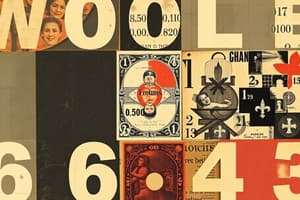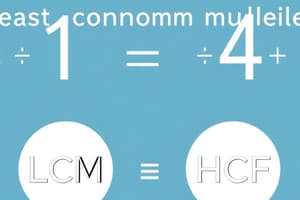Podcast
Questions and Answers
What does understanding the Highest Common Factor (HCF) help us identify effectively?
What does understanding the Highest Common Factor (HCF) help us identify effectively?
- Multiples of a given number
- Prime numbers
- Remainders of a division
- Factors of a given number (correct)
If the HCF of two numbers n and m is 5, what pair of numbers are factors of n?
If the HCF of two numbers n and m is 5, what pair of numbers are factors of n?
- (5, 2)
- (5, 3)
- (5, 4)
- (5, 1) (correct)
How can HCF simplify the task of prime factorization?
How can HCF simplify the task of prime factorization?
- By decreasing the number of prime factors (correct)
- By reversing the order of exponents
- By increasing the number of prime factors
- By changing the prime factors
In prime factorization, what does p^k, q^l,..., r^m represent for an integer?
In prime factorization, what does p^k, q^l,..., r^m represent for an integer?
If n is expressed as 2^3 * 3^2 * 7, what is the effect on determining the HCF involving n?
If n is expressed as 2^3 * 3^2 * 7, what is the effect on determining the HCF involving n?
How do factors help in calculating remainders when a number is divided by another?
How do factors help in calculating remainders when a number is divided by another?
What does HCF stand for in mathematics?
What does HCF stand for in mathematics?
How can the HCF of two numbers be calculated using the divisors?
How can the HCF of two numbers be calculated using the divisors?
What is the HCF of 12 and 18?
What is the HCF of 12 and 18?
Which method efficiently calculates the GCD of two numbers?
Which method efficiently calculates the GCD of two numbers?
What is one practical application of HCF mentioned in the text?
What is one practical application of HCF mentioned in the text?
How can HCF help determine the Lowest Common Multiple (LCM) of two numbers?
How can HCF help determine the Lowest Common Multiple (LCM) of two numbers?
Flashcards
HCF (Highest Common Factor)
HCF (Highest Common Factor)
The largest positive integer that divides two or more integers without a remainder.
GCD (Greatest Common Divisor)
GCD (Greatest Common Divisor)
Another name for HCF, highlighting its use in fraction simplification.
How to find HCF
How to find HCF
List divisors, find the largest one they share.
Euclid's Algorithm
Euclid's Algorithm
Signup and view all the flashcards
Simplifying Fractions
Simplifying Fractions
Signup and view all the flashcards
Solving Linear Equations
Solving Linear Equations
Signup and view all the flashcards
HCF and LCM Relationship
HCF and LCM Relationship
Signup and view all the flashcards
Calculating Remainders
Calculating Remainders
Signup and view all the flashcards
Factors
Factors
Signup and view all the flashcards
Prime Factorization
Prime Factorization
Signup and view all the flashcards
Exponents in Prime Factorization
Exponents in Prime Factorization
Signup and view all the flashcards
Importance of HCF
Importance of HCF
Signup and view all the flashcards
Study Notes
HCF (Highest Common Factor)
The Highest Common Factor (or Highest Common Divisor), commonly abbreviated as HCF or GCD (Greatest Common Denominator), is a fundamental concept in mathematics, particularly within number theory and algebra. It represents the largest positive integer that evenly divides two or more integers without leaving any remainder. This idea can be traced back over 2,500 years to ancient Greece where Pythagorean philosophers first discovered it.
Calculating HCF
To find the highest common factor of two numbers, you follow these steps:
- List the divisors of each number.
- Identify their greatest common divisor from this list.
For example, for 12 and 18:
- Divisors of 12 are {1, 2, 3, 4, 6, 12}
- Divisors of 18 are {1, 2, 3, 6, 9, 18}
Here, the greatest common divisor is 6. Thus, the HCF of 12 and 18 is 6.
Alternatively, we can employ Euclid's algorithm which uses repeated division to calculate the GCD efficiently.
Applications of HCF
HCF has numerous practical applications across various disciplines including:
- Simplifying fractions by canceling out a shared common factor. For instance, (\frac{12}{18}) = (\frac{1\cdot 6}{2\cdot 3\cdot 3}) = (\frac{6}{3\cdot 3}) becomes (\frac{6}{9}) which simplifies to (\frac{2}{3}).
- Solving systems of linear equations with integral coefficients.
- Determining the lowest common multiple (LCM) using the formula LCM = (a\cdot b / \text{HCF}(a, b)).
- Calculating the remainder when one number is divided by another.
Finding Factors
Understanding HCF also helps us identify factors of a given number effectively. Consider a number n with its HCF as gcd(n, m). Any pair of numbers n and k such that n * k = gcd(n, m) are factors of n.
For instance, let's consider n = 12 and m = 18, whose HCF is 6. We know that 12 * 1 = 6 and 12 * 2 = 24, both dividing 12. Other pairs of factors for 12 include (2, 3), (3, 4), etc., all multiples of 6 smaller than 12 itself.
Prime Factorization
Prime factorization refers to expressing an integer in terms of products of primes. By using HCF, we can simplify this task into smaller steps. Specifically, if n is written as a product of p^k, q^l, ..., and r^m, where p, q, ..., r are unique prime numbers, and k, l, ..., m are corresponding exponents, then finding the HCF between n and other numbers solely depends upon the smallest exponent among those involved.
In summary, understanding the Highest Common Factor is crucial because it enables efficient calculations involving different aspects of arithmetic, such as solving fractional expressions and determining factors, remnants, and prime factorizations.
Studying That Suits You
Use AI to generate personalized quizzes and flashcards to suit your learning preferences.




